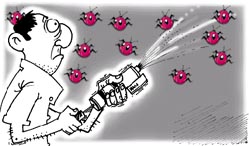Strengthening the act
 the Indian pesticide industry is growing at a staggering rate of about 12 per cent per annum. But, on the other hand, the market is flooded with sub-standard and spurious pesticides. Keeping this in mind, the Insecticide (Amendment) Bill, 2000, that seeks to reform the Insecticides Act enacted in 1968, was recently passed by the Lok Sabha. It proposes stringent punishment for offences committed under the Act. While the amendment awaits the approval of the Rajya Sabha, there is scepticism as to how far it will go in checking the growth of bogus insecticides in the country.
the Indian pesticide industry is growing at a staggering rate of about 12 per cent per annum. But, on the other hand, the market is flooded with sub-standard and spurious pesticides. Keeping this in mind, the Insecticide (Amendment) Bill, 2000, that seeks to reform the Insecticides Act enacted in 1968, was recently passed by the Lok Sabha. It proposes stringent punishment for offences committed under the Act. While the amendment awaits the approval of the Rajya Sabha, there is scepticism as to how far it will go in checking the growth of bogus insecticides in the country.
According to the proposed amendment, which lays down stringent punishment for those manufacturing and dealing with sub-standard pesticides, under sub-section 1 of Section 29 of the Act, the minimum penalty for the first offence will be Rs 10,000 which may extend to Rs 50,000; for second and subsequent offences the minimum penalty will be Rs 15,000 which may extend upto Rs 75,000. Further, the amendment provides that under sub-section 2 of Section 29 a minimum fine of Rs 500 will be imposed on the first-time offenders. This may extend to Rs 5,000 or imprisonment for six months or both.
Some experts believe that such an amendment would help to check growth of illegal pesticides, others feel this to be a mere eyewash. "The basic aim of the amendment is defamation. The high amount of fine and fear of punishment will definitely help check the growth of illegal insecticides, but will they deter the
Related Content
- Recipe for a livable planet: achieving net zero emissions in the agrifood system
- Order of the National Green Tribunal regarding encroachment of three ponds in Darbhanga, Bihar, 30/04/2024
- Africa's pulse, April 2024: tackling inequality to revitalize growth and reduce poverty in Africa
- Order of the National Green Tribunal regarding pollution of Pawana river, Pune, Maharashtra, 05/04/2024
- El Niño in Latin America and the Caribbean: 2023-2024
- Liberia country and climate development report
